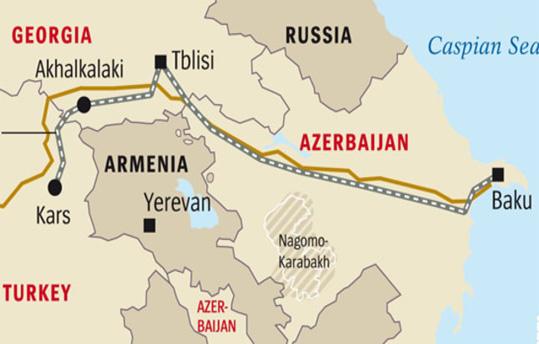Georgia, Uzbekistan, Prioritize the BTK Railway To Boost Trade
Tbilisi and Tashkent are looking to expand bilateral trade to US$500 million.
Georgia and Uzbekistan are looking to develop the Baku-Tbilisi–Kars (BTK) railway route by boosting transport and logistic cooperation, according to reports from the Uzbekistan Ministry of Investment, Industry, and Trade. The BTK route has been beset by problems and has been considered something of a white elephant in Tbilisi as expected freight volumes have failed to materialise.
The issue concerning BTK usage was discussed between Jamshid Khodjayev, Uzbekistan’s Deputy Prime Minister, and Levan Davitashvili, Georgia’s Deputy Prime Minister and Minister of the Economy and Sustainable Development, during the 9th meeting of the Uzbek-Georgian Intergovernmental Commission on Trade and Economic Cooperation.
Georgia and Uzbekistan also discussed the potential of using Georgia’s Black Sea port infrastructure to facilitate trade to Europe. Both countries are looking at increasing their bilateral trade turnover to US$500 million and looking at ways to achieve this.
The BTK railway project links Baku in Azerbaijan with Kars in eastern Turkey via Tbilisi in Georgia, and It is intended to be a new land bridge between the Asian and European markets, through which goods could be transported by rail from one side of Eurasia to another in just 15 days while bypassing Russia.

It was initially scheduled that construction would be completed in 2014, however, numerous problems with Turkish construction firms caused additional delays on Turkey’s section of the BTK project, while Azerbaijan’s and Georgia’s segments were already operational. Covid 19 also delayed completion.
The outbreak of war between Armenia and Azerbaijan in the 2020 Nagorno-Karabakh conflict has also impacted upon the routes effectiveness. Kars was once a border crossing with Armenia, but this has been closed since 1993 and impacts on the ability of Kars as a gateway to Armenian markets. This means that the BTK route is now a conduit for goods being shipped to and from Turkey, Georgia and Azerbaijan to Central Asia and markets such as Uzbekistan, or south via the Caspian Sea to Iran and markets in the Middle East and South Asia.
According to the latest data of Georgia’s National Statistical Committee, bilateral trade between Uzbekistan and Georgia reached US$16.9 million in the two months January to February 2023, decreasing by 23.8%, compared to the figure for the first two months of 2022 at US$22.2 million.
2022’s total trade turnover had reached US$160.1 million, up by 39.6% compared with 2021 and the pre-Ukraine conflict.
Both Georgia and Uzbekistan are members of the Commonwealth of Independent States.
Both sides signed several bilateral documents, including a Protocol on the completion of bilateral negotiations on access to the market of goods and services between Georgia and Uzbekistan within the framework of the accession of Uzbekistan to the World Trade Organization.
Related Reading





